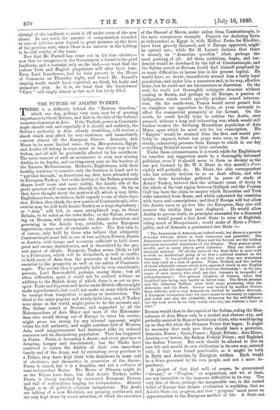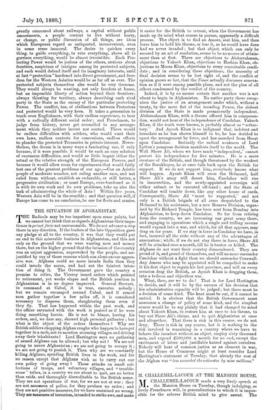THE FUTURE OF ASIATIC TURKEY.
THERE is a difficulty behind the "Eastern Question," which one day, perhaps very soon, may be of pressing importance to Great Britain, and that is, the fate of the Sultan's immense dominion in Asia. If the Turkish power in Constanti- nople should end, and especially if it should end suddenly, the Sultan's authority in Asia, already trembling, will receive a shock which may affect its very existence, and immediately concern almost all the European Powers. Armenia, Asia Minor in its more limited sense, Syria, Mesopotamia, Egypt, and Arabia all belong in some more or less direct way to the Sultan, and all will be profoundly affected by his overthrow. The mere rumour of such an occurrence is even now stirring Arabia to its depths, and exciting every race on the borders of the Eastern Mediterranean. Hitherto, Englishmen, with their healthy tendency to consider only the business in hand, and to "put that through," as Americans say, first, have attended only to European Turkey; but as the destiny of the Balkan peninsula shapes itself more and more visibly, the Asiatic side of the great question will come more directly to the front. So far as they have thought about the matterat all, which is very little, Englishmen have, we believe, held vaguely to one of three theo- ries. Either, they think, the new master of Constantinople, who- ever he may be, will hold Asiatic Turkey as a huge dependency ; or " Asia " will fall, in some unexplained way, to Great Britain, to be ruled as she rules India ; or the Sultan, retreat- ing on Broussa, will reinvigorate his Asiatic dominion, and governing in the Asiatic way, establish, under European supervision, some sort of endurable order. The first idea is, of course, only held by those who believe that ultimately Constantinople must fall to one of two military Powers, Russia or Austria, with troops and resources sufficient to hold down great and uneasy dependencies, and is discredited by the pre- sent aspect of affairs. European Turkey seems likely to fall to a Federation, which will be disinclined, as well as unable, to hold more of Asia than the peninsula of Ismid, which is essential to the prosperity as well as the safety of Constanti- nople. The second idea is probably held by very considerable persons, Lord Beacohsfield, perhaps, among them ; but all other difficulties apart, it could not be realised without an addition to the British Army of which there is as yet no pro- spect. Turks and Cypriots and Arabs under British officers might make a gendarmerie, but could not make an army which would be exempt from temptation to mutiny or insurrection. The third is the more popular and widely-held idea, and, if Turkey were alone in the world, might prove to be the accurate one. The Sultan seated at Broussa, and supported by all the Mahommedans of Asia Minor and most of the Mahomme- dans who would throng out of Europe to enter his service, might prove too strong for any internal opponent, might retain his full authority, and might continue lord of Western Asia, until misgovernment had destroyed alike its reduced resources and its diminishing population. That has happened in Persia. Persia is becoming a desert, and every province is decaying, hungry and discontented ; but the Shahs have contrived to secure the fidelity of their own immediate family and of the Army, and by entrusting every province to a Prince, they have kept their wide dominions in some sort of obedience, and themselves in possession of the throne. Persia is ruined, but it is a kingdom, and not a colluvies of semi-independent States. The House of Othman might do as the Kajars have done, but that Asiatic Turkey, unlike Persia, is closely watched by interested European Powers, and full of nationalities longing for independence. Already Egypt is in all political relations independent. The Arabs are talking of a new Khalifate, are pressing northward, and are only kept down by secret seventies, of which the execution of the Shereef of Mecca, under orders from Constantinople, is the most conspicuous example. Projects for declaring Syria as independent as Egypt is, with Midhat Pasha for Khedive, have been gravely discussed, and if Europe approved, might be carried out ; while Sir H. Layard declares that there is already an "Armenian question" afoot, perhaps the most pressing of all. All these ambitions, hopes, and ten- dencies would be developed by the fall of Constantinople, and the Sultan seated at Broussa would find himself perplexed by as many difficulties as harass him in his present capital. He would have, no doubt, immediately around him a fairly loyal population, and under him a numerous and, in its way, effective army, but he could not use his resources at discretion. On the east, he could not thoroughly subjugate Armenia without rousing in Russia, and perhaps in all Europe, a passion of indignation which would speedily produce armed interven- tion. On the south-west, France would never permit him to slaughter out opposition in Syria, or even seriously to affect the commercial prosperity of the Levant. On the south, he could hardly hope to subdue the Arabs, once aroused, without a long and exhausting war, which would still further weaken the declining Mussulman population of Asia Minor, upon which he must rely for his conscription. His " Empire " would be strained from the first, and would pro- bably be exposed, before ten years were over, to that slow, steady, exhausting pressure from Europe to which in our day everything Oriental sooner or later succumbs.
Under these circumstances, it is worth while for Englishmen to consider any suggestion made by a thoroughly informed politician, even if it should seem to them as dreamy as the one put forward by Mr. W. S. Blunt in this month's Fort- nightly will probably do. Mr. Blunt, the able correspondent who has recently written to us on Arab affairs, and who speaks from knowledge gathered in years of study of Asiatic Turkey, believes that the ultimate cause of decay in the whole of the vast region between Gallipoli and the Persian Gulf has been the claim to empire which Byzantine and Turk alike inherited from Rome, and which exhausted the countries with taxes and conscriptions; and that if Europe will but allow the Asiatic races to go free like the European, they also will recover the vitality they once displayed. He would allow Arabia to govern itself, on principles successful for a thousand years ; would permit a free Arab State to arise at Baghdad, ruling much of Mesopotamia ; would make of Syria a Princi- pality, and of Armenia a guaranteed free State :— " The Armenians of Armenia are indeed weak, but there is a greater Armenia without, which is both numerous and powerful. The Armenians scattered over Asia Minor and the Levant are the boldest and most successful merchants of the Empire. They possess great wealth, and in many places great influence. They are above all intensely national. Of all the races of the East there is none with so wide an intellectual grasp or so firm a political instinct as the Armenian. It has produced in our day more than one statesman who may rank as a man of genius. Nubar, Melikof, and the author of those admirable essays which have appeared lately in our English reviews, under the signature of An Eastern Statesman,'—in the pre- sence of such names, who shall say that Armenia is incapable of self-government ? The present kingdom of Greece, when Sint launched into being, was hardly in better case. The Greek peasant and the Albanian Pallikar were little more promising than the Armenian and the Kurd. Greece was backed by another Greece from without, and so may Armenia be backed by another Armenia. A European occupation may for some years be necessary to organise and teach and arm the miwarlike Armenian for his self-defence ; but the task need be no very costly one, nor," one without a limit in time."
Broussa would then be the capital of the Sultan, ruling the Mug- sulmans of Asia Minor only in a modest and obscure way, and probably assisted by Beys or hereditary chiefs, who would spring up as they did when the Ottoman Power first began. It might be necessary that each new State should have a protector, Armenia, Russia ; Syria, France ; Egypt, Britain ; Asia Minor, Austria,—or better, the Balkan Federal Prince ; and Baghdad the Indian Viceroy. But each should be allowed to live its own life and mould its own civilisation in its own way, assisted only, if that were found practicable, as it might be both in Syria and Armenia, by European settlers. Each would be a State governed by its own people, and not a mere de- pendency. A project of that kind will, of course, be pronounced "dreamy," or Utopian," or unpractical, and we, at least, are not insensible to the immense difficulties in its way. The very first of these, perhaps the insuperable one, is the rooted belief of Europe that Asiatic civilisation is worthless, that no Asiatic State can progress, and that "progress" must mean an approximation to the European method of life. A State not greatly concerned about railways, a capital without public amusements, a people content to live without hurry, or change, or public discussion of all things, are ideas which Europeans regard as antiquated, inconvenient, even in some sense immoral. The desire to quicken every thing, to guide everything, to veto everything, above all to garrison everything, would be almost irresistible. Each Pro- tecting Power would be jealous of the others, anxious about frontiers, suspicious of intrigue among its protected subjects, and each would defend itself and its imaginary interests, until at last "protection "hardened into direct government, and free- dom for the Western Asiatics would be as far off as ever. The protected subjects themselves also would be very tiresome. They would always be wanting, not only freedom at home, bat an impossible liberty of action beyond their frontiers; always thirsting for territory, always describing each rival party in the State as the enemy of the particular protecting Power. The conflict, too, of civilisations between Protectors and protected would be very keen. It takes a generation to teach even Englishmen, with their endless experience, to bear with a radically different social order ; and Frenchmen, to judge from history, never get reconciled to any arrange- ment which they neither invent nor control. There would be endless difficulties with settlers, who would want their own laws, endless contests for concessions, endless efforts to plunder the protected Treasuries in private interest. Never- theless, the dream is in many ways a fascinating one, if only because, if it were possible, it would be such an easy solution of enormous difficulties, and would so little impair either the actual or the relative strength of the European Powers, and because it would allow room for experiments that would fairly test one of the greatest problems of our age,—Can an Asiatic people of moderate number, not ruling another race, and not ruled from without, establish an endurable, or still better, a progressive civilisation ; or must Europe, over-burdened as it is with its own work and its own problems, take up also the task of administering the whole of Asia ? Within five years, Western Asia will be in the crucible ; and that question will, if Europe has come to no conclusion, be one for fleets and armies.



































 Previous page
Previous page